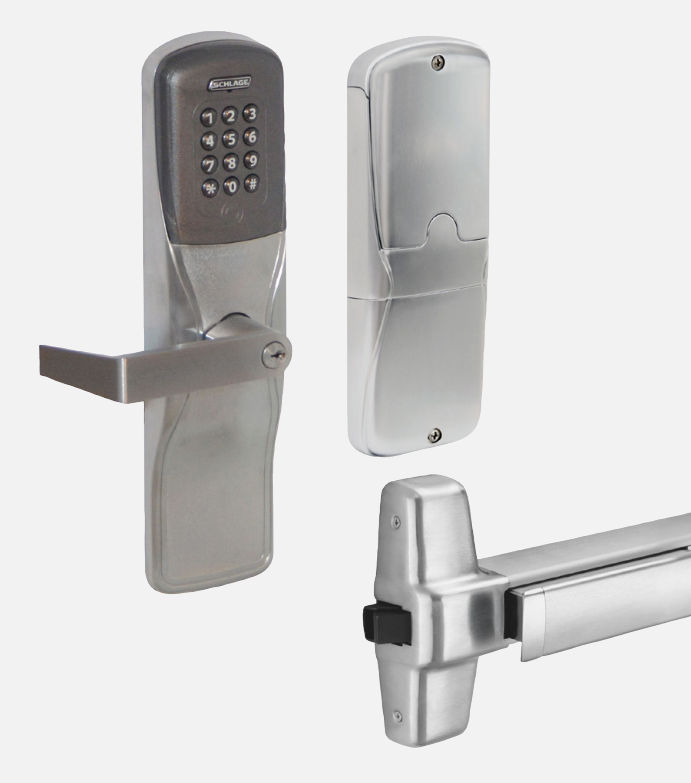In Tuesday’s post I wrote about a change to NFPA 80, which allows field-drilled holes larger than 1-inch diameter in fire doors where allowed by the manufacturers’ listings. This raised a few questions which I will cover in subsequent posts. The first question:
For which types of hardware does NFPA 80 allow job-site preparations to be made in fire door assemblies?
NFPA 80 specifically allows the following preparations to be made on the job site:
- Holes for surface-applied hardware
- Function holes for mortise locks
- Holes for labeled viewers
- A maximum 3/4-inch undercutting of wood and composite doors (verify this with the door manufacturer before modifying the door)
- Installation of protection plates
As I mentioned in Tuesday’s post, holes drilled as job-site preparations were previously limited to 1-inch diameter with the exception of holes for cylinders. The 2016 edition allows holes larger than 1-inch diameter to be drilled at the job-site for surface-applied hardware, where permitted by the door manufacturer’s listing and the hardware manufacturer’s listing.
 The added paragraph specifically mentions surface-applied hardware, so which types of hardware would qualify? NFPA 80 states:
The added paragraph specifically mentions surface-applied hardware, so which types of hardware would qualify? NFPA 80 states:
4.1.3.2.1 Surface-applied hardware shall be applied to the door or frame without removing material other than drilling round holes to accommodate cylinders, spindles, similar operational elements, electrified hardware, and through-bolts in doors.
Rim or surface-vertical-rod panic hardware (fire exit hardware) would be considered surface-applied hardware, as would retrofit electrified lever trim for fire exit hardware – as long as the required job-site preparations only involve round holes. Most door closers, automatic operators, direct-hold electromagnetic locks, gasketing, and coordinators are surface-applied, but keep in mind that all products have to be listed for use on a fire door assembly. And remember, function holes for mortise locks and holes for labeled viewers are also allowed by this section of NFPA 80.
In my opinion, hardware that requires a prep other than a round hole would not be allowed as a job-site preparation. Some examples: a mortise lock pocket, cylindrical lock prep, concealed closer or concealed overhead stop, mortise for butt hinge, shear lock, electric strike that requires a prep beyond a round hole…but keep in mind that some of these preps MIGHT be allowed as a field modification, which is different from a job-site preparation.
You need to login or register to bookmark/favorite this content.





I believe there are two reasons why NFPA 80 requires complex modifications to be performed at the factory: Record keeping, and the quality of the work. I would rather see these requirements spelled out in detail instead of making an assumption that work done in a factory is work done correctly. You only have to see a few overseas door factories to understand why.
If locksmiths could be instructed as to the correct way to modify Fire doors by the manufacturer or by an agency official or even by courses offered by ALOA or other training academy. Why can we not be certified to do this in the field . Makes more sense than removing the door to send it back to the mfg.Waiting two or three weeks or replacing a door at the customer expense .?
Hi David –
A locksmith (or anyone qualified) can do the preps allowed by NFPA 80 as job-site preparations. You can also do field modifications that are pre-approved by the listing lab via the door/frame manufacturer. The pre-approval process takes time and I don’t know that there is a standardized protocol for requesting it, but that would allow you to make modifications in the field beyond the job-site preparations allowed by 80.
– Lori
Thanks Lori . I will check into that as more and more facilities are converting existing KIK- KIl ANSI 161 door preps to panic devices
Just make sure that if it’s a fire door, the label allows fire exit hardware. Some manufacturers are using labels that address both locksets/latchsets and fire exit hardware, but if the label does not mention fire exit hardware, technically you can’t switch the hardware.
– Lori
Even if the door has a label for both locksets/latchsets and fire exit hardware and the door is crossed over from a cylindrical lock to panic hardware, doesn’t the existing cylindrical lock prep still need to be filled in accordance with the door manufacturer’s requirements??
Thank you.
Good point. I know I’ve seen a template for panic hardware on a door with a 161 prep. I wonder if we have one for fire exit hardware with a 161 prep.
– Lori
What if we have a frame and we are altering the anchors? I have a project with two 20-minute rated frames. They want use to add/weld P&D anchors. We’re not necessarily adding holes, but we ARE modifying a rated component. What’s the verdict on things of this nature?
Hi Lisa –
That’s a question for the frame manufacturer. It’s not specifically addressed in NFPA 80.
– Lori
I have yet to get a door pre prepped for a lockset and hinges and have it correct. It is better to get a door slab and prep it myself. Also above it states a cylindrical lock prep is not allowed. A cylindrical lock prep is a round hole and is filled with the lockset itself. I am not trying to argue. I am trying to understand this. It seems inconsistent.